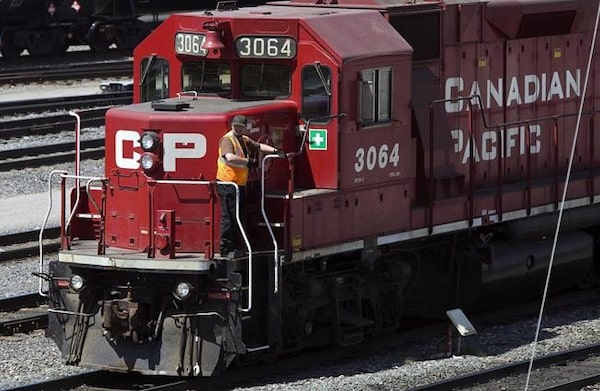More than 3,000 workers are on strike at Canadian Pacific Railway Ltd., halting freight trains on Canada’s second-largest rail network.
The walkout at 10 p.m. ET on Tuesday followed months of failed contract talks between Calgary-based CP and its largest union, Teamsters Canada Rail Conference.
Christopher Monette, a Teamsters spokesman, said mediated talks are continuing but workers have walked off the job.
Meanwhile, CP and the union representing 360 signal workers have reached a tentative three-year agreement.
The deal, announced Tuesday night, ensures passenger service on three commuter railways serving Vancouver, Greater Toronto and Montreal will be uninterrupted.
Details of the agreement with International Brotherhood of Electrical Workers were not released.
The stoppage puts pressure on the federal government. Industry groups that speak for grain growers, chemical makers and other rail customers say a strike will prevent their goods from reaching buyers. They have urged the government to legislate an end to a strike that will strand goods and halt factory output. CP’s major customers include Teck Resources, and potash giant Nutrien.

A Canadian Pacific Railway employee walks along the side of a locomotive in a marshalling yard in Calgary, Wednesday, May 16, 2012.Jeff McIntosh/The Canadian Press
Rival Canadian National Railway Co. and the trucking industry lack the capacity or network to handle CP’s freight.
Prime Minister Justin Trudeau told Bloomberg he will not be as fast as the previous government to legislate an end to any strike. Mr. Trudeau, in comments made earlier on Tuesday, said any government action might also address some of the unions’ concerns.
The CP stoppage follows several months of congestion on much of the Canadian rail network. A backlog of grain and other commodities sparked warnings to both railways from the federal government over service levels.
Teamsters issued a 72-hour strike warning on Saturday, after members overwhelmingly said no to what CP called its final offer. The three-year contract included yearly raises of 2 per cent and higher benefits. The unions complained worker fatigue and mistreatment by management were not addressed.
A strike in April was averted when federal Labour Minister Patty Hajdu halted talks and ordered the company offer be presented directly to workers for a vote. The offers were rejected overwhelmingly by Teamsters votes.
CP’s train crews have gone on strike twice since 2012. A brief walkout in 2015 ended under threat of back-to-work legislation by the Conservative government of former prime minister Stephen Harper. The stoppage in 2012 ended after the same government tabled legislation to end the strike due to harm to the economy. The government also ended strikes at companies in other federally regulated industries, Air Canada and Canada Post.
Keith Creel became chief executive officer of CP in early 2017, after his mentor, Hunter Harrison, quit. Mr. Creel said one of his goals was to improve relations with the company’s 12,000 employees, most of whom are in a union and were bruised after years of layoffs, route restructuring and a regime of harsh discipline under Mr. Harrison.
A CP employee who could not be named because he is not authorized to speak to the media said he is disappointed the union’s concerns were not addressed in the company’s last offer. He said he is resolved a strike is the proper action to take.
In 2017, CP reached new contract agreements with several unions in Canada and the United States, including clerical workers in United Steelworkers of America, police, and Teamsters track crews.
CP has about 1,400 locomotives and a 12,500-mile network from Vancouver to Montreal and parts of the United States.
CP’s 2017 profit was $2.4-billion, a sharp rise from $900-million in 2013. Revenue in the same period rose by just $420,000, amid layoffs and cost cuts.
 Eric Atkins
Eric Atkins